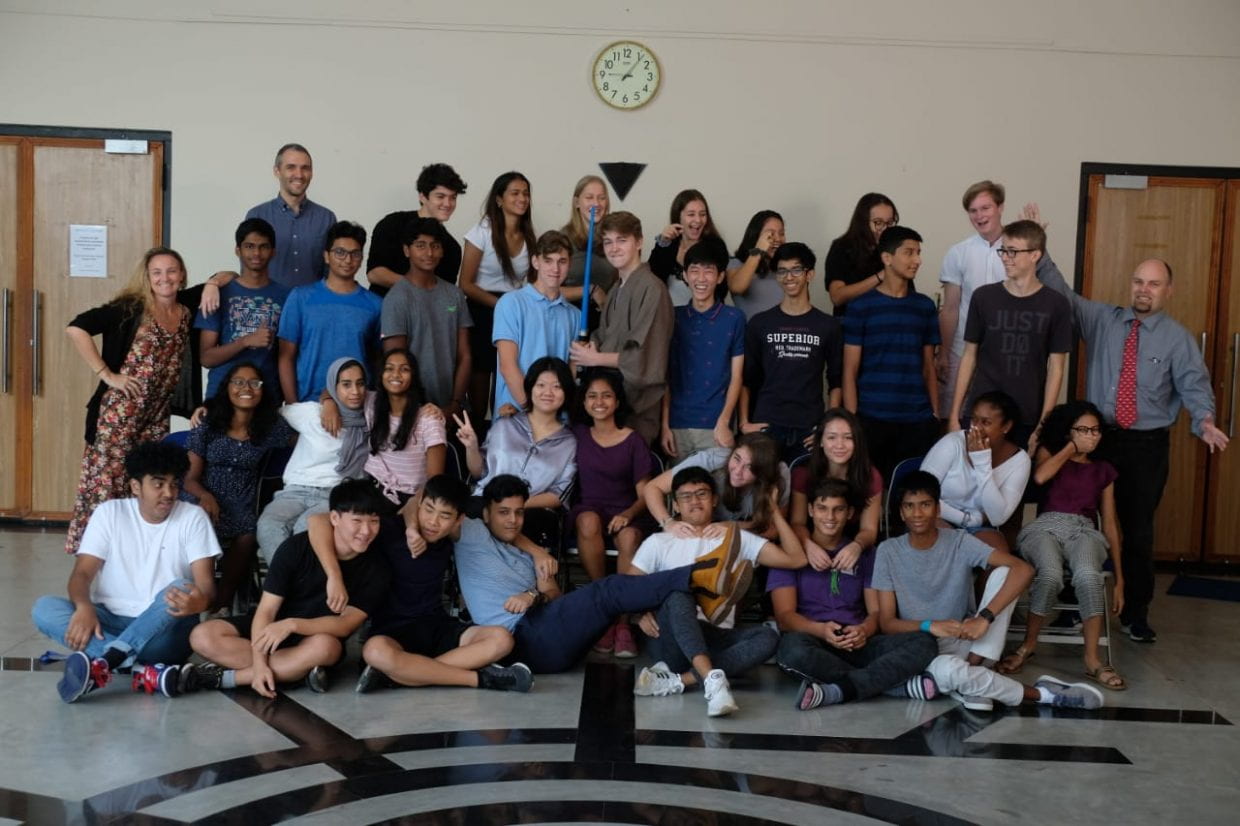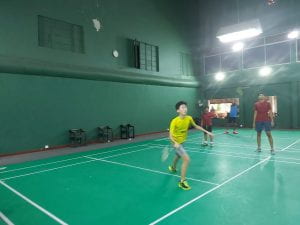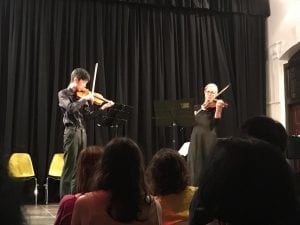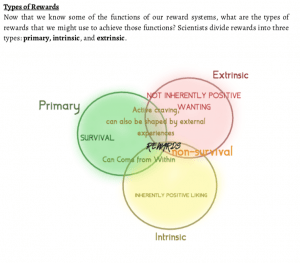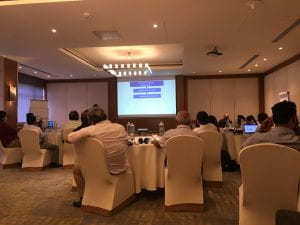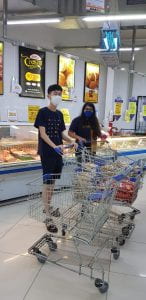Feature image taken by Camera Man.
Creativity, Activity, Service. These are the integral pillars of any International Baccalaureate Diploma student’s experience. They provide the foundations for any individual to excel in their lives outside of the standard school environment. It is safe to say that this program has pushed me out of my comfort zone as it has encouraged me to try things I normally wouldn’t do. But I feel that the most important outcomes of this program is that I was able to further the interests that I already had in more challenging and creative ways. From performing my own trio on the violin at home, to training in badminton intensively for SAISA, to organizing a diaper drive and a food drive for Hope for Kids (during a pandemic I might add), these experiences have extended my passions to new and vitalizing avenues.
Some of my proudest moments throughout these past two years include my Bartok Duos Concert I performed with my violin tutor, leading my service group through the uncertain times of the pandemic with innovative ideas to continue our work, and when I wrote a book with my friend in Shanghai regarding the budding new field of Happiness Research. There is no doubt that I will continue to pursue these interests in my future as it has enriched my life in so many ways. Some of these aspects include the seven learning outcomes listed below. Although some of these features may have been tricky to undertake, such as LO6: demonstrating engagement with issues of global significance, this process has allowed me to push towards more ambitious projects to take on.
So, without further ado, I will now look back on my journey through the past two years and reflect upon how I acknowledged each of the seven learning outcomes outlined by the CAS program.
Learning Outcomes:
1) Identify own strengths and develop areas for growth
While trying my luck out for a SAISA sport, I found volleyball was not my forte. My feet would get all jumbled up in the meticulous footwork routine for a spike, not to mention the hand to eye coordination involved as well, of course. This may not make much sense due to the similarities involved, but regardless, I found badminton to be a much more natural sport for myself. I could find that the skill and strategies involved in the swinging of the racket to get the shuttlecock precisely where you want it on the court to be immensely satisfying. Hence, I decided to pursue this sport further and attempt at getting on the SAISA team, though this could not happen due to the pandemic. However, I believe I had a very good shot at making it due to some of the skills I had developed as a player. I am proudest of the way I can skillfully use my serves to trick the opponent player, more often than not, on where I would have the shuttle go. I crafted my skill of the underhand serve to near-perfection as I would sneakily fake my intention to serve closer to the net when in fact I would serve it straight over their heads, leading to a pleasant ace.
2) Demonstrate that challenges have been undertaken, developing new skills in the process
Performing on my violin has always been a bit of a challenge for me to overcome. I may have practiced the piece and memorized it by heart and yet when the nerves come, they do indeed come. Hence, I take on opportunities such as this provided by my violin tutor to have a performance in front of a live audience so that I can work on my craft. In preparation for this particular concert, I was able to develop my skill of engaging the audience while I played this piece of music. It was my intention to not only play correctly but also expressively to convey some level of meaning or story to the audiences. It helped that my tutor would guide me in these steps, including the imagination of various settings that the music could be applied to or the context in which Bela Bartok, the composer, wrote the music. As a result, this experience gave me a deeper understanding of both the performative aspects of music and the interpretative side.
3) Demonstrate how to initiate and plan a CAS experience
During the summer of 2020 at the height of the pandemic, I knew it was up to myself to plan and initiate a CAS experience so that I may spend my time more productively at home during the lockdown period. That is when I came across the online website edx.org where they host numerous free online lessons conducted by university professors from renowned institutions. Intrigued, I signed up for one that I had particular interest in during that summer regarding development economics. So, over a 3-week period I planned out my schedule so that I might have a lesson every day or every other day to cover the various topics within this unit. At the end of this course, I acquired a much more extensive idea of the way societies function and how such societies grow through stages of development to reach propserity. I was able to apply what I had learned in the course to the final essays where I analyzed how Sri Lanka fell upon the stages of development. In the future, this helped me figure out a theme of what I might want to pursue in the future, and led me to seek out an internship at an NGO.
4) Show commitment to and perseverance in CAS experiences
In terms of commitment and perseverance to a project, there is none I pursued more intensively than the Happiness in Action project where I collaborated with a friend in Shanghai to write an educational book aimed at adolescents regarding the budding new field of Happiness. We had planned together to uncover the vast, but disconnected, aspects of happiness research across various disciplines ranging from economics, politics, philosophy, psychology, and public policy to coalesce a coherent and digestible educational tool. Amazingly, it took us a month to complete this enormous task but we worked night and day, laboring for hours on end, to research, to write, draw, and style the book in just the way we wanted. This is perhaps one of my proudest projects thus far and we have even been able to self-publish this book on Amazon for millions of people to see, free on ebook too.
5) Demonstrate the skills and recognize the benefits of working collaboratively
The Oliver Band provided the perfect space for fun and exciting collaborative musical works. We didn’t just work amongst ourselves in the band but also worked with the cast and crew of the Oliver musical that the school production was putting on. This made for an exhilirating experience to add musical life to the scene of the stage. The entire process took months of work and long hard hours at home practicing the numbers to perfection to be executed on the three nights of performance. Together, we were able to create a beautiful work of art as we added to melody, harmony, and rhythm of the music which then accompanied the soloists or chorus which contributed to the entire musical production. It was a wonder to witness this and also be a part of the creation, an opportunity I will never forget and will continue to look for in my life as I find joy in this collaborative experience of creating art.
6) Demonstrate engagement with issues of global significance
The Solidarity Center internship is possibly my boldest decision to take on for the CAS program and my own interests. In light of my newfound interest in development in developing countries, I sought out a matching internship that might shed light into this field of work and how organizations like NGOs functioned. Knowing that Sri Lanka is a home country for many migrant workers working in the Middle East, I found an organization that worked as an advocacy group for these type of workers’ rights in the Solidarity Center. This is a major global issue faced by various developing economies as many workers go abroad to earn wages which they send back home as remittances, providing support of their home economies and families. Hearing about the abuse of workers’ rights abroad and at home here in Sri Lanka led me to draft a report on the level of achievement made by the government of the SDG Goal 8: Decent Work & Economic Growth. This not only helped me develop my research skills and find a certain affinity to the work of NGOs, but it also led me to engage in more conferences to take minutes and notes of the latest developments made in the industry so that my boss could be aware of the changes. All in all, I believe this experience has given me a solid foundation on the workings of organizations such as these and valuable work experience regarding conferences and webinar work.
7) Recognize and consider the ethics of choices and actions
The Hope for Kids service group has always dealt with particularly fragile situations as it involves the palliative care of children diagnosed with cancer. Hence, it is our responsibility to ensure that we take this into consideration and conduct our work with an acknowledgement of the contexts involved. These include the ethics behind the decisions we make. For example, certain items such as chocolates cannot be donated to the CCC House as giving them such treats may be cruel as they aren’t usually allowed access to such treats. Hence, we resort to other tasty delicacies like banana cake which we have passed around the compound several times upon special occasions like Christmas or Halloween. However, this does not stop us from taking the ethical action of providing them with as much support as we can, even during a time like the pandemic. As such, we have continued our annual food drive despite the restrictions put in place. In fact, we have been able to do two food drives this year and a diaper drive upon their request of needing those items. I am proud to say that overall, we have successfully fulfilled the ethical considerations of this work which have led to great results for everyone.
